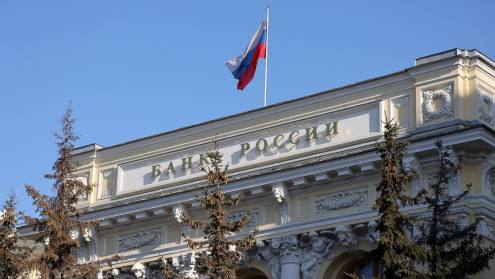Set up as a universal bank in 1992, Rosbank has been a pioneer in the development of Russia’s capital markets. Growing quickly, it already ranks as a top three underwriter and lead manager for Russia’s biggest corporate bond issues.
Russia put in more than 7% GDP growth in 2003 and companies are hunting for investment capital as they struggle to keep up with demand. At the same time, tax reform and rising profits have bolstered regional and municipal tax revenues.
Russia’s rouble bond market allows banks to pool their resources conveniently, and is becoming a ready supply of working and investment capital for domestic investors. Strong domestic demand has been reinforced by a favourable external climate that is fuelling a boom in the Russian capital markets. “The high level of central bank reserves, the surpluses in the trade and capital accounts and the weak dollar on the global markets are all making the Russian bond market more attractive,” says Alexander Popov, chairman of Rosbank.
Demand recovers
A slowdown on the domestic bond market in the second half of last year put pressure on underwriters but since January demand has recovered. “Competition is growing and the second half of last year was not a very positive time for the underwriters as they failed to distribute issues properly as demand fell off,” says Mr Popov.
The rouble bond market virtually disappeared as a result of the 1998 financial crisis. But the volume and number of rouble bonds has doubled every year since the market reappeared in 2001.
By the end of 2002, Rosbank had issued more than Rbs50bn ($1.76bn) in bonds, and added another Rbs19.6bn worth of sub-federal and municipal debt as well as another Rbs9.1bn of corporate bonds last year alone. “Market forces have become the main issue,” says Mr Popov. “Since the start of the year, high international commodity prices have brought a strong inflow of liquidity into the economy, fuelling the demand for corporate and municipal debt.”
More banks are competing for a bigger slice of a growing pie and this is eroding margins. But domestic bonds are selling fast with banks being the biggest buyers, as they look for investments to soak up their excess liquidity. Banks hold about 90% of all the bonds issued and have drained the secondary market almost dry. “Liquidity in the secondary market has disappeared and it has become hard to find attractive offers. Investors have focused on the primary market because it is the only place where it is possible to find decent-sized blocks of bonds,” says Mr Popov.
Bringing new issues to market is where the action is. Each month another record falls, as bond issues that were delayed during political turbulence in 2003 are relaunched. Last month, Rosbank was one of the lead managers of two new record bonds: gas monopoly Gazprom, Russia’s largest company, issued a Rbs10bn bond and the state-owned pipeline monopoly Transneft is expected to float a Rbs12bn issue in March.
Falling yields
The corporate and municipal markets are well established but yields are falling: prime rates on bonds are between 7% and 15%. However, with inflation of 12% at the end of 2003, the best companies are already issuing bonds with negative real interest rates.
“The market is widening and we are expecting lots of second tier names to issue this year,” says Mr Popov. “But the market is still narrow, and in both the bond and equity markets there are only a few names present.”
Strong capital and current account surpluses have driven the Central Bank of Russia’s gross international reserves over the record $80bn mark and this liquidity has spilled over into the banking sector. With interest rates falling, banks have also begun tapping earnestly into the domestic capital markets to raise funds that can be lent on to enterprises. Rosbank has been a pioneer among banks and offered a Rbs3bn bond last month, which was met with strong demand.
Russia’s leading commercial banks are already actively seeking out emerging companies and bringing them to market but the financial sector is approaching retail as the next major milestone on the road. Last year, Rosbank bought First OVK in a record-breaking $200m merger, which boasts the biggest retail network after state-owned Sberbank.
“For us, retail distribution is a top priority, to structure asset-managed products for retail markets. There are a limited number of local institutional investors and retail is the big coming market,” says Mr Popov.











